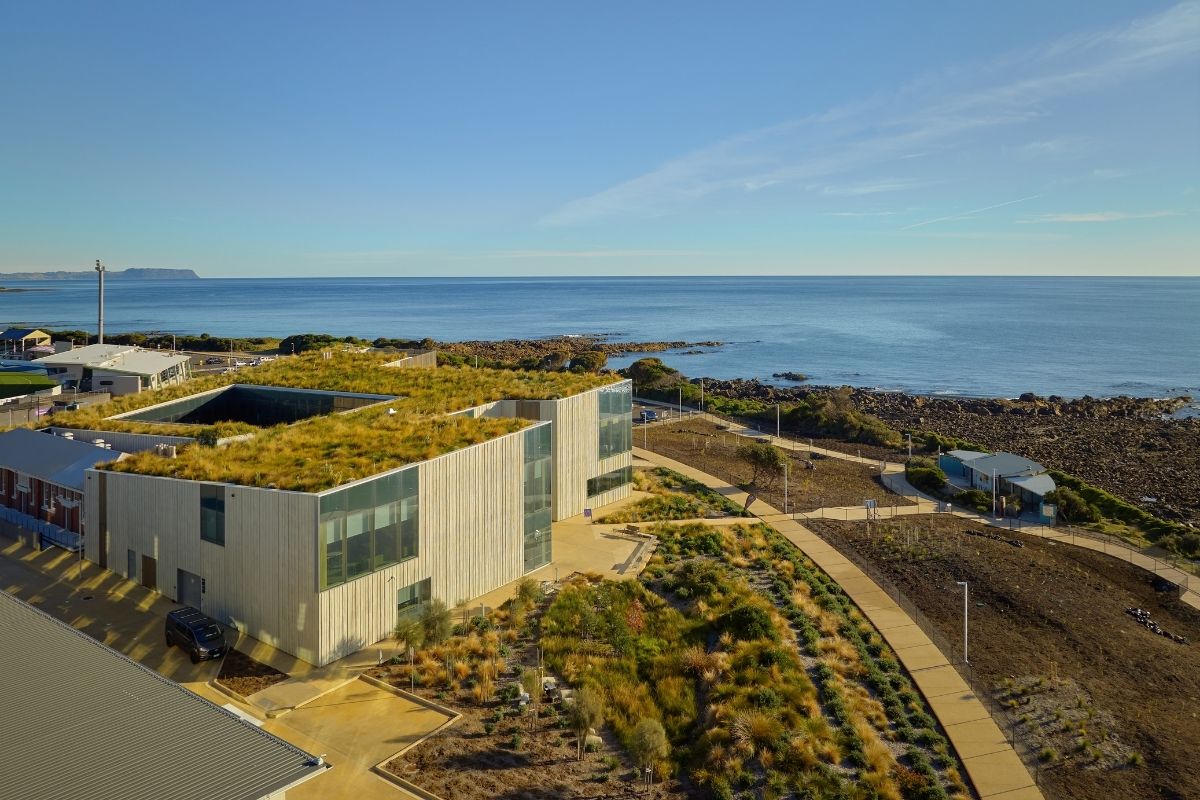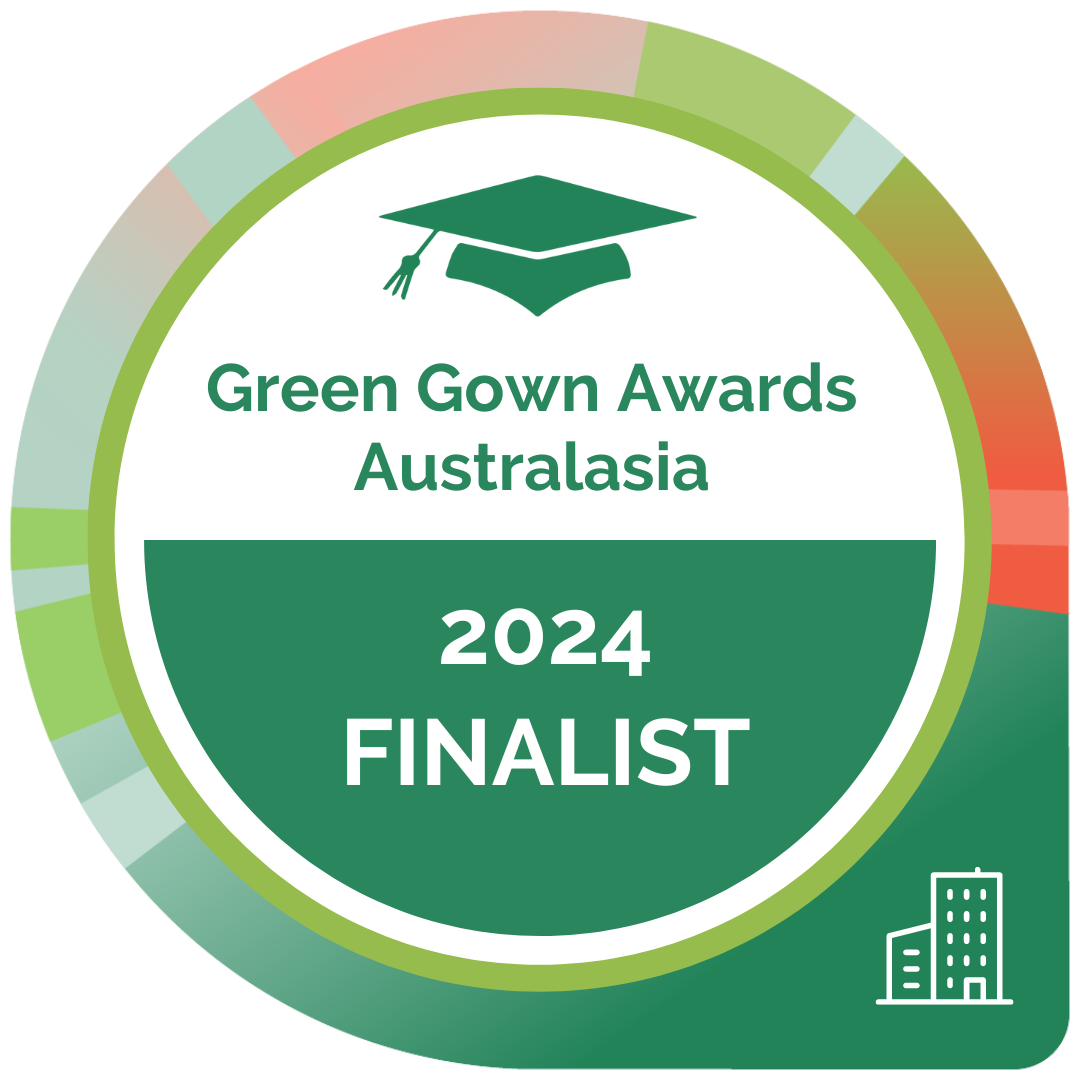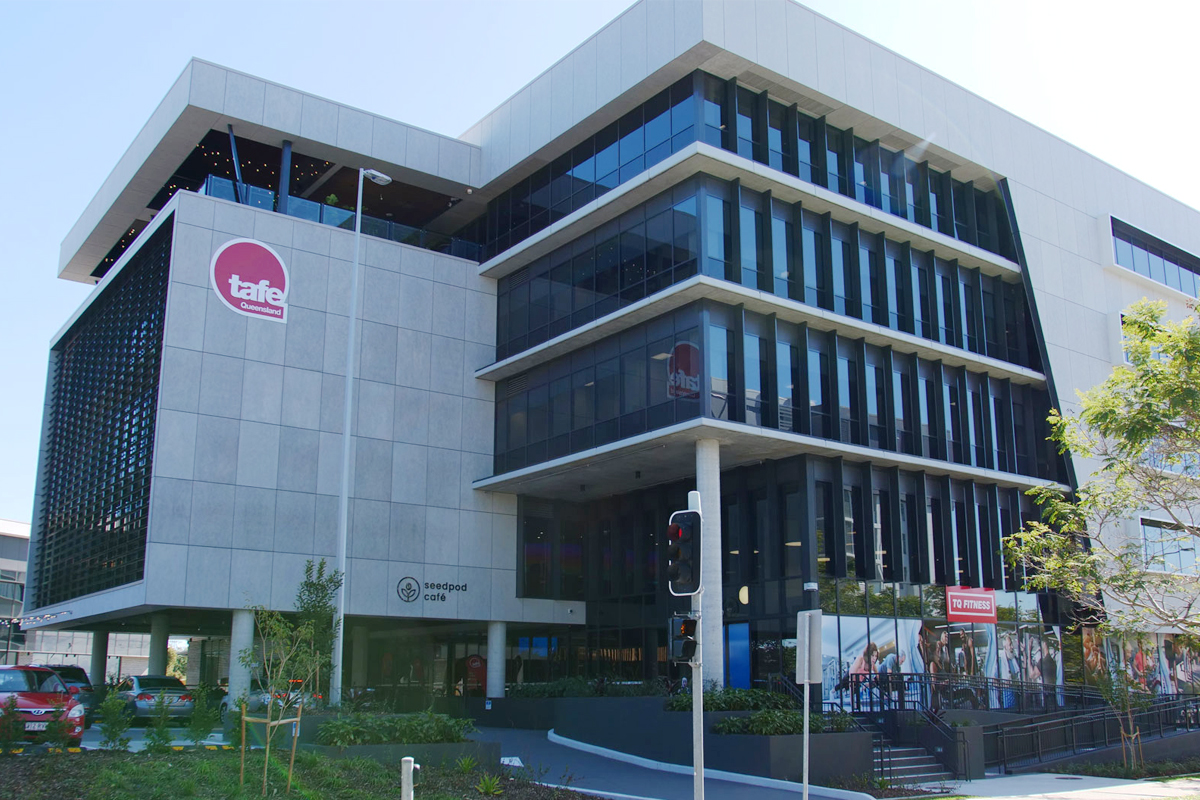Sustainability Institution of the Year category
The University of Tasmania (UTAS) continues to lead as a sustainability institution, demonstrating significant advancements in holistic sustainability practices across its campuses. Building on its long-standing commitment to the Sustainable Development Goals (SDGs), UTAS has implemented a series of bold initiatives since its 2021 Green Gown Award win, including an elevation in its Sustainability Tracking, Assessment & Rating System (STARS) to Gold, and a steady rise in the Times Higher Education Impact Rankings, achieving equal 2nd place globally in 2024. The university’s approach is embedded into its Strategic Plan (2019-2024) and even more deeply integrated into its strategy refresh for 2025 and beyond, with sustainability integral to every facet of its operations, curriculum, research and community engagement.

Environmental and Social Benefits
- Carbon Neutral Leadership: UTAS has maintained its Commonwealth Climate Active carbon neutral certification since 2016 and continues to drive emissions reductions through its Emissions Reduction Strategic Plan, targeting a minimum 50% reduction in gross emissions by 2030 on a 2015 baseline.
- Waste Reduction and Circular Economy: The university has implemented a comprehensive Waste Minimisation Action Plan, achieving significant reductions in waste to landfill through initiatives like organic waste collection, recycling walls for non-standard recyclables, and an innovative Re-Use Program that has saved over $1.1 million and avoided more than 450 tonnes of CO2 emissions since 2017.
- Socio-Cultural Sustainability: UTAS has prioritised social equity through initiatives like its Healthy Sustainable and Equitable Food Strategic Plan, mental health and wellbeing programs, and efforts to close the gender pay gap, which is now among the smallest in the sector at 6.9%.
Leadership and Engagement
- Strategic Leadership: The appointment of the first Chief Sustainability Officer in Australasian higher education and the establishment of a dedicated Sustainability Centre on the Sandy Bay campus underscore UTAS’s leadership commitment. The university’s senior management actively supports sustainability initiatives, resulting in increased institutional buy-in and widespread participation.
- Student and Staff Involvement: UTAS has engaged hundreds of staff and students in its sustainability journey through governance, educational programs, and hands-on projects. The Sustainability Integration Program for Students (SIPS) and the new Sustainability Placement Experience unit, the University Global Opportunities (UniGO) program and the Sustainability University Major (SUM) have seen significant growth, with the latter expected to surpass 250 students by 2025.
- Community Impact: UTAS’s partnerships with local government and community organisations have led to impactful initiatives like the Kelcey Tiers Greenbelt Reserve BioBlitz and contributions to Tasmanian climate and environmental policies through the Tasmanian Policy Exchange.
Significance to the Sector
- Innovative Practices: UTAS has set a new standard in the sector with its holistic approach to sustainability, including the integration of innovative new low-carbon materials, such as Hempcrete, in building projects and the transition to a fully electric fleet by the end of 2024. The university’s use of Green Bonds to fund sustainable development projects exemplifies its innovative financial strategies for sustainability.
- Global Leadership and Recognition: UTAS’s consistent improvement in the Times Higher Education Impact Rankings and its STARS Gold rating position the university as a global leader in sustainability. Its leadership roles in networks like the Nature Positive Universities network and the Climate Action Barometer further highlight its influence in the international sustainability arena.
- Replicable Model: The university’s comprehensive approach, which includes embedding sustainability across its curriculum, operations, research and community engagement, offers a replicable model for other institutions seeking to achieve similar sustainability goals.
Wider Societal Impact
- Policy Influence and Advocacy: UTAS’s contributions to policy development, particularly through the Tasmanian Policy Exchange, have influenced state-wide environmental and sustainability legislation, demonstrating the university’s broader societal impact.
- Educational and Research Contributions: The university’s focus on sustainability in education and research, including its leadership in climate change research and its collaboration with global organisations like the IPCC, has positioned UTAS as a key player in advancing global sustainability knowledge and practices.
- Economic and Environmental Resilience: Through its sustainable practices and educational programs, UTAS is not only enhancing its own resilience but also contributing to Tasmania’s economic and environmental sustainability, particularly in areas like renewable energy and biodiversity conservation.
The University of Tasmania’s comprehensive and forward-thinking approach to sustainability continues to set benchmarks in the higher education sector. Through innovative leadership, extensive student and staff engagement, and a commitment to social and environmental equity, UTAS exemplifies what it means to be a Sustainability Institution of the Year. Its holistic integration of sustainability into every aspect of its operations, combined with its significant contributions to global sustainability efforts, positions UTAS as a leader and a model for other institutions worldwide.
Top 3 learnings
Category finalists
Sustainability Institution of the Year/Winners
Sustainability Institution of the Year/Winners
Sustainability Institution of the Year
Sustainability Institution of the Year
Past winners
Benefitting Society/Winners
Benefitting Society/Winners
Diversity, Equity & Inclusion in Sustainability/Winners
Diversity, Equity & Inclusion in Sustainability/Winners
Climate Action/Winners
Climate Action/Winners
Sustainability Institution of the Year/Winners
Sustainability Institution of the Year/Winners
Creating Impact/Winners
Creating Impact/Winners
Creating Impact/Winners
Creating Impact/Winners
Top 3 learnings
Sustainability Institution of the Year category
The University of Tasmania (UTAS) continues to lead as a sustainability institution, demonstrating significant advancements in holistic sustainability practices across its campuses. Building on its long-standing commitment to the Sustainable Development Goals (SDGs), UTAS has implemented a series of bold initiatives since its 2021 Green Gown Award win, including an elevation in its Sustainability Tracking, Assessment & Rating System (STARS) to Gold, and a steady rise in the Times Higher Education Impact Rankings, achieving equal 2nd place globally in 2024. The university’s approach is embedded into its Strategic Plan (2019-2024) and even more deeply integrated into its strategy refresh for 2025 and beyond, with sustainability integral to every facet of its operations, curriculum, research and community engagement.

Environmental and Social Benefits
- Carbon Neutral Leadership: UTAS has maintained its Commonwealth Climate Active carbon neutral certification since 2016 and continues to drive emissions reductions through its Emissions Reduction Strategic Plan, targeting a minimum 50% reduction in gross emissions by 2030 on a 2015 baseline.
- Waste Reduction and Circular Economy: The university has implemented a comprehensive Waste Minimisation Action Plan, achieving significant reductions in waste to landfill through initiatives like organic waste collection, recycling walls for non-standard recyclables, and an innovative Re-Use Program that has saved over $1.1 million and avoided more than 450 tonnes of CO2 emissions since 2017.
- Socio-Cultural Sustainability: UTAS has prioritised social equity through initiatives like its Healthy Sustainable and Equitable Food Strategic Plan, mental health and wellbeing programs, and efforts to close the gender pay gap, which is now among the smallest in the sector at 6.9%.
Leadership and Engagement
- Strategic Leadership: The appointment of the first Chief Sustainability Officer in Australasian higher education and the establishment of a dedicated Sustainability Centre on the Sandy Bay campus underscore UTAS’s leadership commitment. The university’s senior management actively supports sustainability initiatives, resulting in increased institutional buy-in and widespread participation.
- Student and Staff Involvement: UTAS has engaged hundreds of staff and students in its sustainability journey through governance, educational programs, and hands-on projects. The Sustainability Integration Program for Students (SIPS) and the new Sustainability Placement Experience unit, the University Global Opportunities (UniGO) program and the Sustainability University Major (SUM) have seen significant growth, with the latter expected to surpass 250 students by 2025.
- Community Impact: UTAS’s partnerships with local government and community organisations have led to impactful initiatives like the Kelcey Tiers Greenbelt Reserve BioBlitz and contributions to Tasmanian climate and environmental policies through the Tasmanian Policy Exchange.
Significance to the Sector
- Innovative Practices: UTAS has set a new standard in the sector with its holistic approach to sustainability, including the integration of innovative new low-carbon materials, such as Hempcrete, in building projects and the transition to a fully electric fleet by the end of 2024. The university’s use of Green Bonds to fund sustainable development projects exemplifies its innovative financial strategies for sustainability.
- Global Leadership and Recognition: UTAS’s consistent improvement in the Times Higher Education Impact Rankings and its STARS Gold rating position the university as a global leader in sustainability. Its leadership roles in networks like the Nature Positive Universities network and the Climate Action Barometer further highlight its influence in the international sustainability arena.
- Replicable Model: The university’s comprehensive approach, which includes embedding sustainability across its curriculum, operations, research and community engagement, offers a replicable model for other institutions seeking to achieve similar sustainability goals.
Wider Societal Impact
- Policy Influence and Advocacy: UTAS’s contributions to policy development, particularly through the Tasmanian Policy Exchange, have influenced state-wide environmental and sustainability legislation, demonstrating the university’s broader societal impact.
- Educational and Research Contributions: The university’s focus on sustainability in education and research, including its leadership in climate change research and its collaboration with global organisations like the IPCC, has positioned UTAS as a key player in advancing global sustainability knowledge and practices.
- Economic and Environmental Resilience: Through its sustainable practices and educational programs, UTAS is not only enhancing its own resilience but also contributing to Tasmania’s economic and environmental sustainability, particularly in areas like renewable energy and biodiversity conservation.
The University of Tasmania’s comprehensive and forward-thinking approach to sustainability continues to set benchmarks in the higher education sector. Through innovative leadership, extensive student and staff engagement, and a commitment to social and environmental equity, UTAS exemplifies what it means to be a Sustainability Institution of the Year. Its holistic integration of sustainability into every aspect of its operations, combined with its significant contributions to global sustainability efforts, positions UTAS as a leader and a model for other institutions worldwide.
Related finalists
Sustainability Institution of the Year/Winners
Sustainability Institution of the Year/Winners
Sustainability Institution of the Year
Sustainability Institution of the Year
Other finalists
Climate Action

Driving Towards Tomorrow’s Campus with Vehicle-to-Grid EV Technology
As part of Flinders University’s drive to innovate and become a leader in climate action, the University launched its Vehicle-to-Grid (V2G) initiative. This involved installing and maintaining 20x V2G and smart chargers for its growing electric vehicle fleet. Leveraging 100% renewable energy generated by ENGIE’s Willogoleche Wind Farm and Flinders University’s solar power systems, this enables the storage of renewable energy in EV batteries to be discharged on campus during peak demand periods. Hence, allows for these EV fleets to operate as a Virtual Power Plant (VPP) to deliver peak demand management and optimization of behind-the-meter generation.
Overall, this initiative demonstrates the reliability and scalability of bi-directional and uni-directional smart-charging systems for EVs in reducing GHG emissions while facilitating teaching, research, and innovation opportunities. Moreover, it exemplifies a sustainable and innovative solution to scale energy storage technology and increase renewables.
Sustainability Champion – Staff/Winners

Brandan Espe
Environmental Officer / Acting Grounds Supervisor
Brandan has brought over 50 federally listed Endangered species of plant into the James Cook University living collection, many of which have never been cultivated and are found in no other collection in the world.
Of these, over half have been sustainably wild collected, inclusive of field and clone data, so they can be used for ongoing conservation, research and teaching, the remaining being sourced from private and partner organisations through favours of service or trades.
He personally funded the project from 2019-2022, until funding was awarded for the program due to its success, with the program now being engrained into the Universities landscapes for ongoing management should he leave JCU, creating a threatened species legacy collection.
The program has now expanded beyond this, with an additional 48 species now funded for further addition, some of which are only known from less than 5 sightings in history.
Student Engagement

Sustainability Leaders creating real impact!
La Trobe created a unique Sustainability Leaders volunteering program to increase engagement with students on campus and empower them to act against waste and promote sustainability. It included the following initiatives:
- Promoting the reusable crockery implementation,
- Increasing knowledge action of other students on campus to diversion comingled recycling and organic waste from landfill.
- Focus on waste audits and data,
- Improved signage through new waste posters for students living on campus.
- Collaboration with Cirka (our cleaning and waste partner) to create a waste wall and;
- Learning all things sustainability (net zero, biodiversity, waste, reusables, engagement)
These initiatives yielded significant results and with a reduction in waste contamination by almost 40% at the residential buildings and engagement with over 80 groups of people for the Reusable Revolution.
Creating Impact

Where knowledge meets habits: Empowering students for a sustainable tomorrow
Our online Sustainability Challenges offer participants an engaging, self-paced learning experience centered around a specific United Nations Sustainable Development Goal (UNSDG). Requiring minimal resourcing and at zero-cost to participants, we’ve created replicable, compact, scalable, and impactful learning opportunities that result in real impact.
The Challenges follow a structured process that moves participants from knowledge gain to simple action to celebration, to establish small but mighty habits relating to waste and carbon emissions. This approach recognises that knowledge alone is often insufficient to drive behaviour change, and that ease of action and celebration are crucial components in creating sustainable habits.
Sustainability Champion – Staff/Winners

Catherine (CeeJay) Donovan
Veterinary nurse – Anaesthesia
From establishing the Massey Vet School Green Team to leading impactful initiatives, my commitment to environmental sustainability has been making waves. With the help of my team, I have accomplished numerous small, yet meaningful actions, including integrating a sustainability lecture for final year vet students and implementing battery recycling alongside rechargeable battery use. Our larger projects encompass the introduction of green waste and soft plastics recycling bins, an energy audit resulting in power-saving measures, and playing a part in a successful rubbish audit. I spearheaded the ‘6 in 6’ campaign, empowering individuals with six simple steps for workplace sustainability. Through the SustainaVet social media pages I help to educate and inspire peers nationwide. As the Massey School of Veterinary Science sustainability champion, I had the privilege of speaking at the annual veterinary conference on sustainability in clinical practice. Currently I’m conducting pioneering research on responsible cat waste disposal. Together, we’re forging a greener future, one initiative at a time.
Sustainability Champion – Student

Louis Walmsley
SDG Coordinator Monash Association of Sustainability, Office Bearer Monash Student Association’s Environmental and Social Justice Department, Masters of Environment and Sustainability Student
Louis is an exceptional student sustainability leader at Monash University. His passion and dedication to sustainability have made a significant impact on the community. Louis’s values revolve around sustainability, which is evident upon meeting him. He actively participates in various sustainability groups, demonstrating his commitment to creating a more environmentally conscious society.
One of Louis’s notable involvements is with Precious Plastic Monash, where he organizes remarkable events and fosters collaboration among like-minded individuals, student groups, and staff. His contributions to the Monash Association of Sustainability have allowed him to conduct valuable research on plastic usage and climate action, resulting in positive changes within the university.
Through his work with the Monash Student Association, Louis has engaged hundreds of students in fun and interactive sustainability initiatives. He took the initiative to organize a sustainability food fair, which was one of the largest sustainability-related events held at Monash post-COVID. This accomplishment is a true testament to Louis’s hard work and creativity.
Louis is an outstanding student leader whose efforts in sustainability have had a lasting impact on Monash University and its community. His inspiring nature resonates with everyone who knows him.













